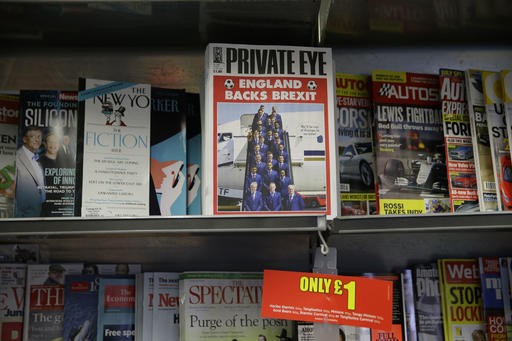Popular Reads
Top Results
Can't find what you're looking for?
View all search resultsPopular Reads
Top Results
Can't find what you're looking for?
View all search resultsBrexit and its aftermath for Indonesia
So, what does it all mean for Indonesia? As the UK itself is not a huge part of the world economy and Indonesia’s exports to the UK are a mere 0.9 percent of its total exports, the key implication for Indonesia is what happens to the EU, still the single most important market in the world. Indonesia’s non-oil exports to the EU represent about 11 percent of total non-oil exports, making it the second-largest export destination for Indonesia after the US.
Change text size
Gift Premium Articles
to Anyone
The UK’s referendum vote to leave the EU has unleashed a wave of unease in the corridors of power and in financial markets.
Although financial markets have bounced back, this does not mean that the damaging effects of uncertainty have somehow gone away — rather, more aftershocks lie ahead for the global economy with material consequences for Indonesia.
There is a huge uncertainty about the political and economic consequences of the Brexit vote. The uncertainty is just beginning and it can only get worse.
With UK politics in ferment, the country could break up: Scotland, Northern Ireland and London voted fervently to remain in the EU while the rest of England and Wales voted to leave.
There is a very real risk that Scotland will seek independence as a result. Scottish First Minister Nicola Sturgeon, who leads the pro-independence Scottish National Party, is committed to finding a “way to keep Scotland in the European Union”.
She is astute enough not to demand an immediate referendum for Scotland to leave the UK, but will do so when she is confident that she will win such a referendum.
Her insistence to “have a referendum within that two-year process” is to allow the likely convoluted Brexit negotiations and its damaging effects on the UK economy to arouse Scottish resentment and so make it more likely that she will win the referendum.
Moreover, while the deep sectarian divisions within Northern Ireland make it unlikely for the province to leave the UK and re-unify with Ireland, Sinn Féin, the political party that supports a united Ireland, has intensified its demand for a border poll.
Deep divisions within the ruling Conservative Party and the main opposition Labor Party will make it all the more difficult for the UK to meet these immense challenges to its integrity.
The EU faces dislocation as well: The UK’s exit has encouraged nationalistic anti-EU politicians including Marine Le Pen, president of the National Front in France, Geert Wilders; head of the Dutch Freedom party in the Netherlands, and other radical right-wing parties in Sweden and Denmark to also demand referendums of their own.
There are also political factions who while wanting to remain within the EU, see an opportunity to push radical changes in the EU’s policies. Polish Prime Minister Beata Szydlo and Hungarian Prime Minister Viktor Orban have pounced on this opportunity to challenge policies fundamental to the EU such as free movement of labor.
Globally, the UK vote will reinforce the backlash against globalization and economic integration that has favored Asia, including Indonesia: Political elites everywhere have taken fright at the raw emotions against immigration and cosmopolitan elites that the UK vote has exposed.
Coming as the US endures an increasingly bitter presidential election campaign in which Donald Trump, the Republican candidate is outrageously stirring up such divisions, there are growing fears of a widening pushback against free trade.
In fact, Global Trade Alert has warned of a sharp rise in trade restrictions in recent years.
A long-drawn UK withdrawal process implies prolonged uncertainty: New UK Prime Minister Theresa May has stated that “Brexit means Brexit”, meaning that while she had campaigned for Remain, she will not seek some kind of formula which keeps the UK within the EU.
Her challenge will be to find a formula which appeases UK voters’ demands for restrictions on the entry of EU citizens into the UK while still retaining access to the EU’s single market.
But the EU values the ideal of free movement of labor as sacrosanct and is unlikely to allow such access without May compromising on the immigration issue.
It will take a long and tortuous process before an adequate compromise is crafted, if that is even possible. In other words, there are good reasons to expect more turbulence and more convulsions in the global economy.
So, what does it all mean for Indonesia? As the UK itself is not a huge part of the world economy and Indonesia’s exports to the UK are a mere 0.9 percent of its total exports, the key implication for Indonesia is what happens to the EU, still the single most important market in the world. Indonesia’s non-oil exports to the EU represent about 11 percent of total non-oil exports, making it the second-largest export destination for Indonesia after the US.
Since the uncertainty will undermine business confidence, capital spending and hiring will slow and that will hurt consumer spending in turn. Until the outcome of Brexit negotiations are known, it will be difficult for investors to make decisions, and this kind of large-scale ambiguity will hinder investment and growth.
It could get worse. If the EU leadership fails to quell the burgeoning anti-EU backlash in the rest of the region, speculation that more countries could withdraw from the EU will build and Europe’s fragile recovery and that of the world economy would be at risk.
Global demand for Indonesia’s exports will weaken, and the prices of Indonesia’s commodities could also fall further, adding to the pain.
We could also see another round of financial market turbulence. The resulting volatility will hurt Indonesian equity and bond markets, and place the Rupiah under downward pressure.
Politically, the UK’s vote to leave the EU has led to the questioning of regional organizations. ASEAN’s integration efforts could be indirectly impacted as the assumption that regional cooperation will continue to progress in a positive linear upward trend is ceasing to remain the norm.
Furthermore, with the recent verdict on the South China Sea, ruling in favor of the Philippines, ASEAN will face its biggest test of cooperation yet.
This could lead to further pressure on Indonesia and the role it plays in stabilizing regional tension while sustaining its economic growth as it averts the economic effects of Brexit.
In short, while there are no direct risks of the Brexit to Indonesia, it adds to the litany of woes that has triggered global uncertainty in recent months.
This amplifies the need for Indonesia to be more flexible and remain open to alternate avenues for growth and also improve its ability to respond to unprecedented developments.
***
The writer is chairman of the Indonesian Chamber of Commerce and Industry (Kadin). The views expressed are his own.
---------------
We are looking for information, opinions, and in-depth analysis from experts or scholars in a variety of fields. We choose articles based on facts or opinions about general news, as well as quality analysis and commentary about Indonesia or international events. Send your piece to community@jakpost.com.










